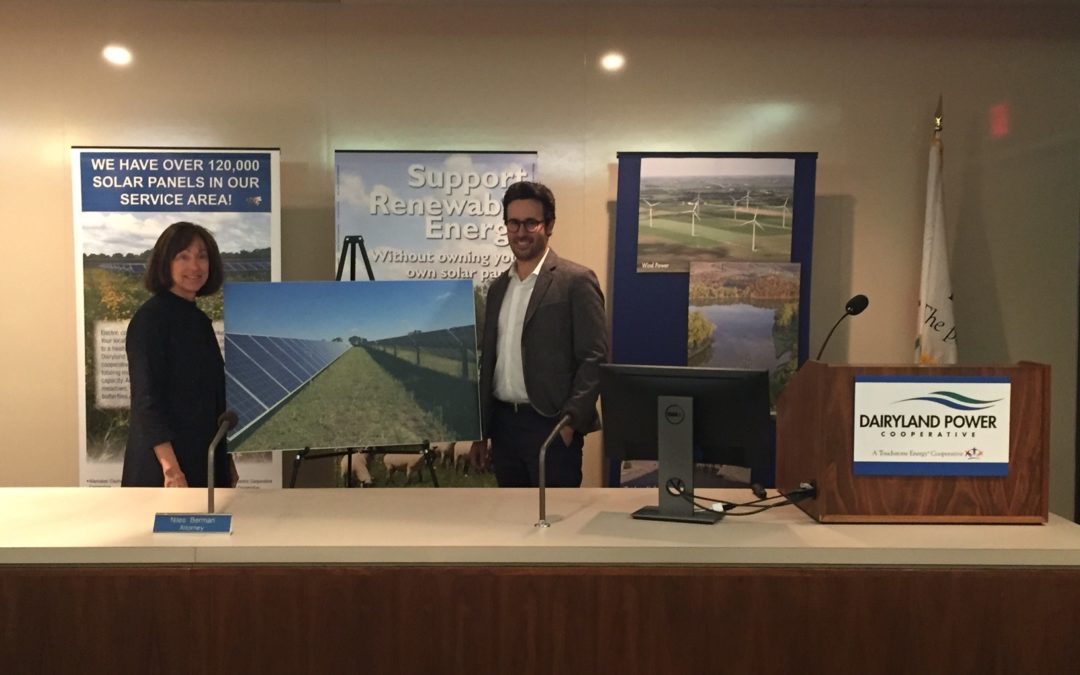
by Tyler Huebner | Mar 18, 2019 | Renewables, Solar, Utilities
Today at their headquarters in La Crosse, Dairyland Power Cooperative announced that it will be purchasing electricity from a major new Wisconsin-based solar energy facility being developed by Ranger Power.
The partnership involves a 149 megawatt solar power facility called Badger State Solar which is planned to be located in Jefferson County, Wisconsin. Ranger Power is planning to develop, own, and operate the project. Dairyland Power Cooperative will purchase all the electricity generated from the project through a long-term power purchase agreement.
The project will produce enough electricity to provide the equivalent annual needs of about 20,000 homes. If all approvals are granted from local and state permitting processes, construction would begin in 2020 and operation would commence in 2022.
RENEW Wisconsin’s Executive Director Tyler Huebner said, “Today’s announcement shows that solar power has become a cost-effective resource for Wisconsin’s major power providers such as Dairyland Power. By committing to this solar project which will be built right here in Wisconsin, Dairyland will meet its goals of a safe, reliable, affordable, and increasingly sustainable and diversified energy supply. We congratulate Dairyland Power Cooperative and Ranger Power on this historic announcement!”
By RENEW Wisconsin’s count, the state had about 103 megawatts of solar at year-end 2018, with Dairyland Power Cooperative responsible for about 20 megawatts, already placing it as the leader in the state for the amount of solar installed to-date. This project, along with a number of additional major solar projects, will dramatically increase the amount of solar energy produced in Wisconsin in the next five years.
More information about the project is included in the links below.
Dairyland Power Press Release
Badger State Solar Project Fact Sheet
Badger State Solar Project Economic Impact
Featured in image: Dairyland Power President and CEO Barb Nick and Ranger Power CEO Paul Harris
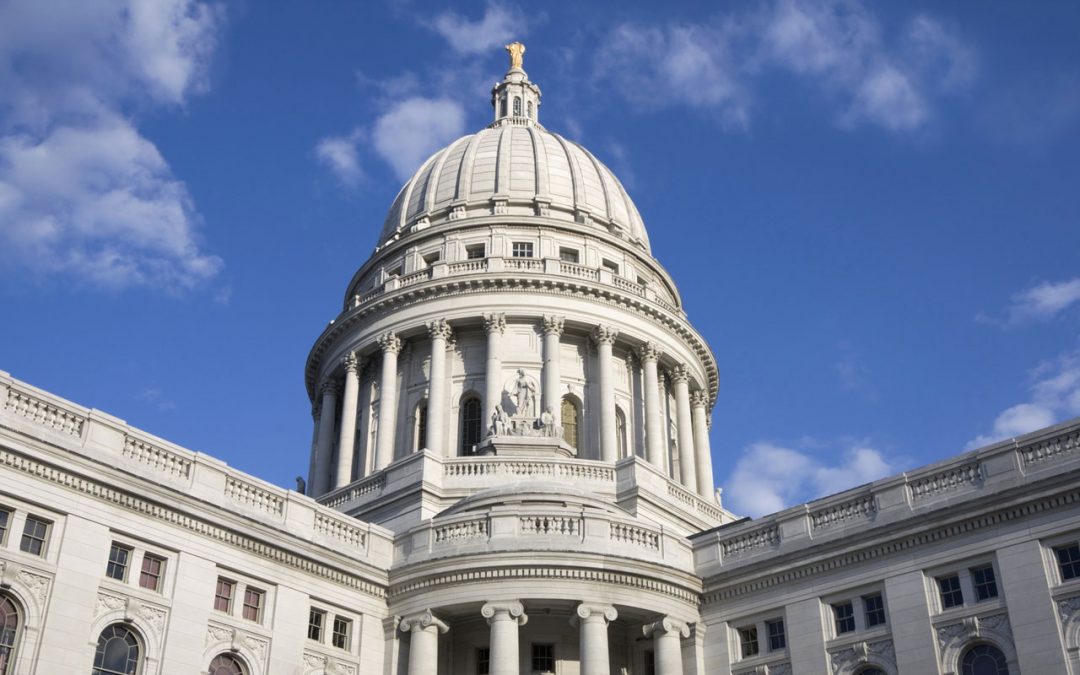
by Jim Boullion | Mar 13, 2019 | Advocacy, Electric Vehicles, Focus on Energy, Policy, Renewables
On February 28, Governor Tony Evers released his 2019-2021 state budget. The budget bill will now go to the Joint Finance Committee who will review it and get briefings on the various provisions from the Governor’s administration and specific state agencies. The committee will also hold a series of hearings around the state to learn what the general public thinks about the budget bill provisions. By statute, the budget bill is supposed to be complete by July 1st, but that date is not often met, regardless of which party holds power. Between now and then, please contact your state legislators and let them know what you think about the various provisions of the bill. You can find your legislator’s contact information by following this link.
Below is a short summary of the Governor’s proposals related to clean energy.
100% Carbon-Free Goal
Establishes a state goal that all electricity produced within the state should be 100 percent carbon-free by 2050. While not a mandate or requirement, writing this goal in Wisconsin’s statutes will help state agencies, the legislature and the public know what we are trying to achieve.
Allocate $75 million in bonding to fund energy conservation projects on state-owned facilities. $25 million of these funds would be allocated to renewable energy projects.
These funds will be used for energy conservation projects to help state agencies and UW System meet their energy reduction goals and reduce utility costs. Renewable projects could include solar, wind, standby generators or geothermal enhancements to state facilities. The achieved savings from the reduction in utility costs would be used to pay the debt service payments on the bonds.
Focus on Energy
Allows the Public Service Commission to increase funding for the Focus on Energy program beyond the current statutory limit of 1.2 percent of utility revenues. The bill also requires the PSC to submit to the Joint Finance Committee a proposal for spending a greater percentage on the programs than is currently allocated (The amount is to be determined by the PSC).
Create the Office of Sustainability and Clean Energy
Transfer the State Energy Office and its employees from the PSC to the Department of Administration. The new office would:
- Administer a $4 million clean energy research grant.
- Advise state agencies in developing sustainable infrastructure to reduce energy use.
- Study and report on the status of existing clean and renewable energy efforts by the state.
- Serve as a single point of contact to assist organizations pursuing clean energy opportunities.
- Identify clean energy funding opportunities for private and governmental entities.
- In coordination with other state agencies, collect and analyze data needed for clean and renewable energy planning and review those plans with the governor and legislature.
Use a Portion of VW Settlement Funds for EV Charge Station Grants
Spend $10 million of the remaining $25 million from the Volkswagen emissions settlement on grants for electric vehicle charging stations. The rest would be dedicated to replacing public transit vehicles. $42 million of the original $67.1 million that Wisconsin was allocated from the settlement was spent in 2017-19 for replacement of state vehicles and the transit assistance program.
Hybrid Vehicle Registration Fees – Definition expanded to include all hybrids, not just PHEV’s
All hybrid vehicles (any vehicle that uses a battery to increase mpg) would pay the additional $75 annual fee that was originally designed to cover only Plug-in-Hybrid vehicles. This is in addition to the proposed $96 (up from $75) annual vehicle registration fee paid by all vehicles. All-electric vehicles would continue to pay the additional $100 annual fee that was already in the statutes. The fee is designed to recover the sales taxes that would have been paid if they were powered by gasoline that is used to support the transportation budget.
WEDC Tax Credits for Energy Efficiency or Renewable Energy
WEDC would be allowed to award business tax credits of 5% for investments made on projects that improve energy efficiency or that generate energy from renewable resources.
Ratepayer Advocate (Intervenor Compensation) Grants
The bill increases from $300,000 to $500,000 the annual grants the PSC is allowed to make to nonprofit corporations that advocate on behalf of utility ratepayers.
If you have any questions or would like more information about any of these energy related issues please contact Jim Boullion, RENEW Wisconsin’s Director of Government Affairs.
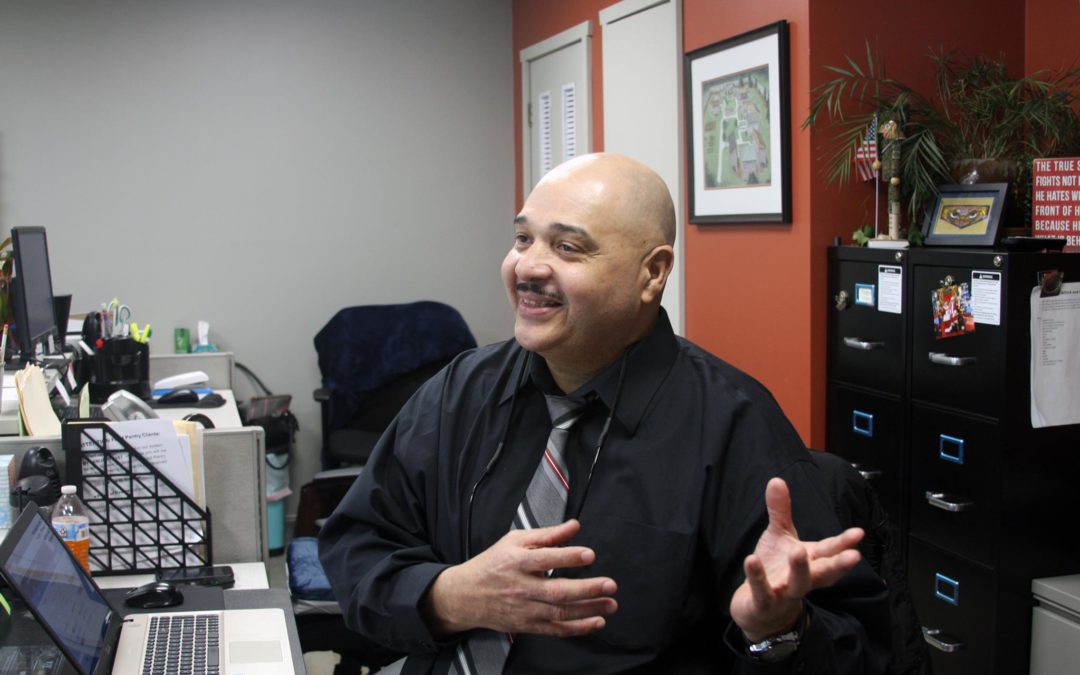
by Jodi Jean Amble | Feb 26, 2019 | RENEW Wisconsin, Renewables, Solar for Good
“I worry about my children and grandchildren and not leaving a mess for them. Having something sustainable for them. I think solar is a great idea. It’s the gift that keeps on giving.” These are the words of Mike, a navy veteran, and former police officer who lives in the James A. Peterson Veteran Village in Racine, WI. It’s a complex of 15 tiny homes and a community center that is now powered by the sun.
Mike spent 6 years in the navy and traveled all over the world. After his service, he went to school and then joined the police force in Chicago. “I spent 20 years in law enforcement. You’ve been doing something so long. Then I lost my wife, my house. I was homeless when I found out about Veterans Outreach in Racine. Jeff and Shannon welcomed me in.”
Mike was a yeoman in the navy, performing administrative and clerical work. This experience landed him a job in the Veterans Outreach office. According to Mike, Veterans Outreach of Wisconsin serves about 300 veterans per week in the food pantry. They also provide clothing, transportation (when needed), and tiny homes for veterans in the back. The tiny houses provide residents with a bed, television, and a small storage space. “You have to come out of there for the bathroom, shower, and the best kitchen in the world!” Mike said. “A lot of guys want to try to isolate, but you have to come in and you start talking. It’s good that you have to leave that cabin. You get up, take a shower, check your email, and slowly get yourself back into it.”
Veterans Outreach of Wisconsin is different than a shelter. It’s a recovery program offering meals, classes, and connections. The organization helps veterans find jobs and offers financial classes and community meetings. “They are good people,” Mike said. “They don’t get a lot of money, but they seldom say ‘no’ to anybody.”
According to the U.S. Department of Veterans Affairs, almost 38,000 Veterans are experiencing homelessness. While this number declined by 5% between 2017 and 2018, it’s still a distressing statistic. This is what inspired Jeff Gustin to co-found the center in 2013. “The whole idea that someone puts a uniform on and ends up homeless is crazy. Our nation is better than that,” Jeff said.

Walden Middle and High School, a school that focuses on the environment and sustainability, approached Veterans Outreach about helping them put solar on their SC Johnson Community Center. The Walden High School students raised over $20,000 for the solar project and the students’ efforts inspired a $10,000 matching grant from an anonymous donor. They also received a $10,000 Solar for Good grant, and were awarded a Focus on Energy prescriptive grant. Veterans Outreach paid for the rest of the project with their own funding, costs they plan to recover through offset electricity bills.
“It took very little to get this off the ground for us. The school approached us about it. We weren’t in a position to do this ourselves. We were just getting residents moved in and they ran with it. We had very little we had to do on our end and we’re very grateful.” Jeff said. The nearly 20 kilowatt array, installed by Arch Electric, is expected to save the organization almost $4,000 in annual utility costs. That’s money that the Veterans Outreach can put towards their mission. “For the person that does the bills. It’s huge for us,” Jeff said.
Jeff, Mike, and the rest of the Veterans Outreach team are still learning about solar and seeing the actual cost savings at the end of the year may inspire them to look into other solar projects. They just bought two new buildings to accommodate a larger food pantry to serve their clients. “I’m glad we’re lowering our carbon footprint. This is our future,” Jeff said. “One day I might go back to the high school and ask them if they’re ready for round two!”
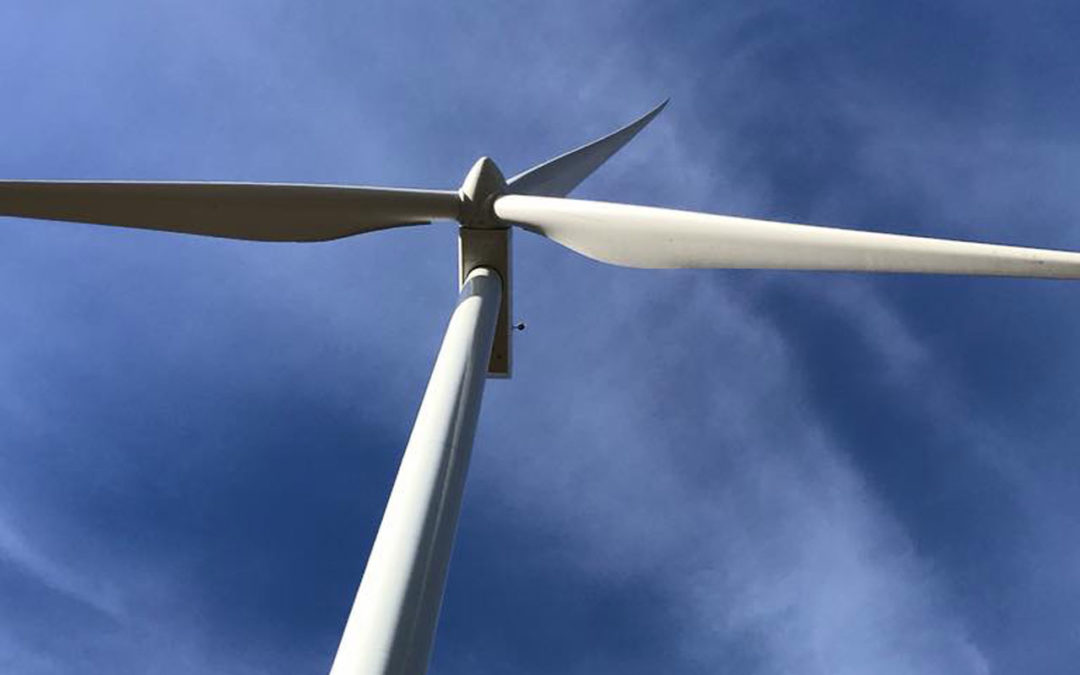
by Heather Allen | Feb 22, 2019 | Renewables, Utility Scale, Wind
After a prolonged absence from Wisconsin, wind developers are starting to come back to the Badger State with a desire to build projects. EDF Renewables, a nationally prominent renewable energy developer, has applied to construct and operate Green County’s first wind farm near the Illinois border. Called the Sugar River Wind Farm, this 24-turbine project would, if approved, generate an amount of electricity equal to what 20,000 households typically consume.
The Green County Board of Supervisors will review EDF’s 236-page application, which was submitted in late January, and will likely make a decision on the 65-megawatt project in July.
To accommodate the turbines, EDF envisions leasing almost 6,000 acres of farmland in the Town of Jefferson from area property owners. Participating landowners expect to continue farming operations while the wind farm operates.
As with other wind projects, the Sugar River Wind Farm will have a significant impact on the local economy. According to the application, more than $550,000 will flow to local landowners and governments each year during the project’s operation. Of that total, Green County and the Town of Jefferson will reap a combined $250,000 annually in the form of utility local aids.
Jefferson Township’s annual tax revenue income could increase by nearly 40% over 2019 levels as a result of this project. The project will also support 70 to 100 temporary construction jobs and three to five operations jobs over the life of the project.
If approved, Sugar River would be the second major wind energy development in Wisconsin to advance after a protracted lull in wind development activity that lasted between 2011 and 2017. Between a hostile political environment and a glut of generating capacity, utility-scale wind development activity languished in Wisconsin. During the dry spell here, developers flocked to neighboring states to tap into one of the most cost-effective clean energy sources available to utilities. The door reopened slightly when Dairyland Power Cooperative agreed to purchase electricity generated from Quilt Block Wind Farm, which started operating in November 2017.
Local Businesses Benefit from Wind Farms
Located in Lafayette County, Quilt Block has been hailed as a success by community leaders from the Town of Seymour and the City of Darlington.
“The Quilt Block Wind Farm in Darlington is a great asset to the City of Darlington and to Lafayette County,” said Darlington Mayor Dave Breuning. “During the construction, the employees were great to work with and they were very supportive of the retail businesses in Darlington.”
Mayor Bruening noted that Quilt Block’s labor force drove Ford trucks and had their vehicles serviced at the local auto dealership. Employees patronized area grocery stores and gas stations, and took their printing work to the local print shop, he said. “And then the Quilt Block Wind Farm built the office and garage in the Darlington business park. What a great addition to the City!”
More Efficient Wind Farms Lead to New Wind Proposals
Wind projects have become increasingly productive, as turbines are designed to be taller with longer blades to capture winds higher up in the sky that blow at faster speeds. “There’s an old physics equation that says when you can double the speed of the wind you are catching, the power that you’ll produce goes up eightfold,” Tyler Huebner, Executive Director of RENEW Wisconsin. “It’s a cubed relationship.” As the technology improves and wind farms become more cost-competitive, developers are working again in Wisconsin and coming forward with new proposals.
Wind Regulations and Project Review Timeline
When it took effect in 2012, Wis. Admin. Code § PSC 128 established the formal process that all local governments must abide by when reviewing permit applications for wind farms under 100 MW. The rule also set standards that local governments may apply to the placement of wind turbines as well as their construction and operation. Local governments have the option of adopting, for example, setback distances that are less stringent than the baseline standards in PSC 128. However, they may not impose standards that are more stringent than those specified in that rule. Wind energy projects in excess of 100 MW are reviewed by the Public Service Commission.
Green County has 90 days from the date of the application (Jan 30, 2019) to adopt a wind energy ordinance and an additional 90 days to review and approve the proposed project. At its March 12, 2019, meeting Green County Board of Supervisors will consider a resolution to adopt a wind ordinance. Wind energy projects that aren’t approved by the County within the two consecutive 90 day periods after an application is submitted are automatically approved.
How Can I Support Wind Development in Green County and Wisconsin?
Green County residents can send an email to the Green County Board of Supervisors. Their contact information is available here.
Learn more about wind. A report titled “Wind Turbines and Health” was recently issued by three organizations: the Environmental Health Sciences Research Center (which exists within the University of Iowa College of Public Health), Iowa Policy Project, and Iowa Environmental Council. The report summarizes the results of the most rigorous research available on the benefits and risks related to wind power.
Join RENEW’s information session about wind power on March 25, 2019, at 5 pm at the Monroe, WI Super 8 Motel. Enjoy refreshments and hear from the Mayor of Darlington and his colleagues talk about their experience in Lafayette County with the Quilt Block Wind Farm.
*This blog post was written by Heather Allen with contributions from Michael Vickerman.
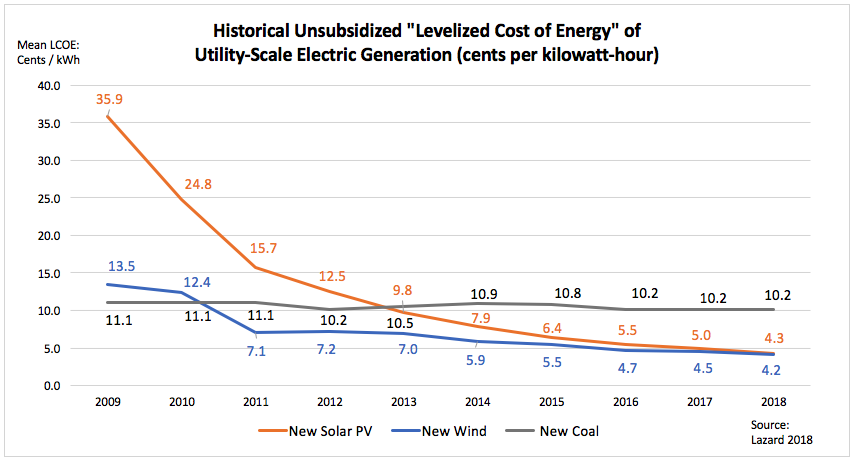
by Tyler Huebner | Feb 13, 2019 | Renewables
Yesterday, Wisconsin Manufacturers and Commerce President Kurt Bauer issued a statement regarding Wisconsin Governor Tony Evers’ pledge to join an effort to reduce Wisconsin’s carbon emissions in accordance with the goals of the “Paris Climate Accord.” Regardless of your position on climate change or the Paris Climate Accord, Mr. Bauer’s assertions about the economics of reducing carbon emissions are based on outdated math, especially as it relates to the price of electricity and switching to renewable energy.
Since 2009, the cost of delivered electricity from new wind energy farms has declined 69%, and the cost of delivered electricity from new utility-scale solar farms has declined 88%.
In their “Levelized Cost of Energy Version 12.0,” (available here) released in November 2018 by Lazard, a respected international finance company, the numbers about the unsubsidized cost of renewable energy are plainly spelled out.
Furthermore, a recent open bidding process in Colorado resulted in dozens of wind, solar, and battery storage proposals. Selecting the lowest-cost set of projects, Colorado policymakers and the utility were able to identify a set of projects that replaced existing coal generation while saving ratepayers $213 million to $374 million. (Source: Greentech Media)
Major Wisconsin utilities are currently pursuing their own least-cost pathway to future electric generation, and it involves shutting down older, less-efficient, and more costly coal plants while reinvesting in new wind and solar generation. Why? In their own words, it will save their customers money.
Just yesterday, in its quarterly earnings call, WEC Energy Group, which produces about half of the electricity used in Wisconsin, Executive Chairman Gale Klappa said “[W]e made real progress in reducing our carbon dioxide emissions. In fact, we are on track to exceed our goal of 40% reduction below 2005 levels by the year 2030. Now we expect to achieve that goal by 2023.”
The times have changed, and Wisconsin Manufacturer & Commerce’s math is outdated. Corporate America, including some of Wisconsin’s best job creators and industries of the future, are investing in renewable energy, saving money, and creating jobs.
Instead of just saying no, we would encourage WMC and its members to work with the renewable energy industry, electricity providers, Governor Evers, and the Legislature to pursue cost effective ways to take advantage of the new economics and technology advances in renewable energy. Renewable energy is now a job-creating and money-saving opportunity for its members and all businesses across Wisconsin.
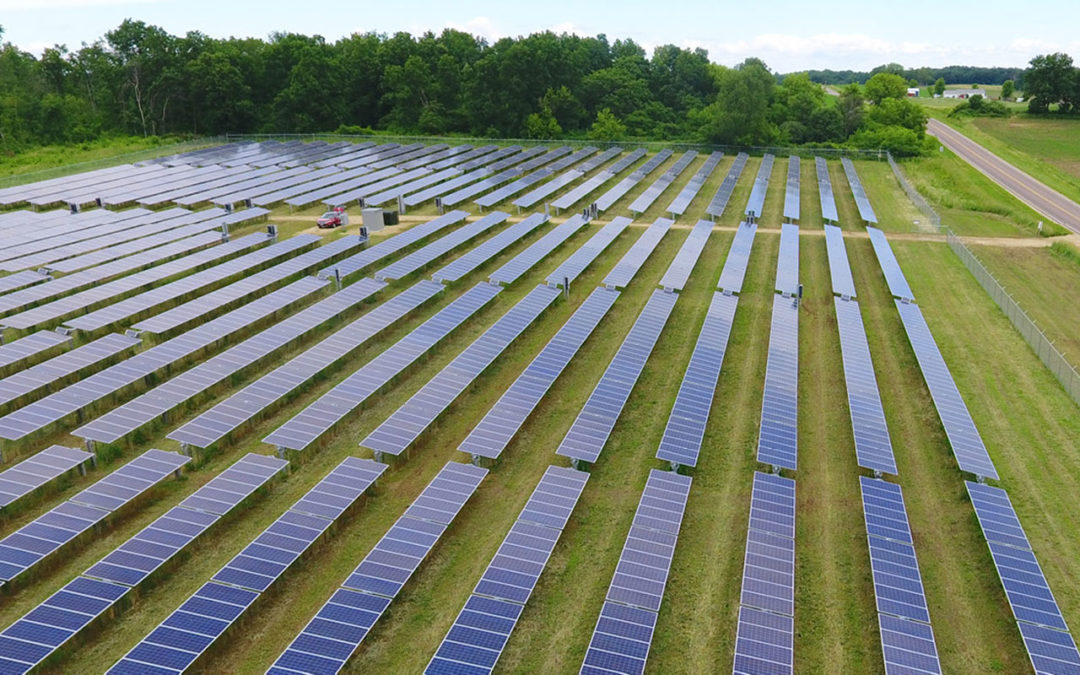
by Michael Vickerman | Feb 11, 2019 | Renewables, Solar
Saratoga Wind
Owner: Madison Gas and Electric
Location: Howard County, Iowa
Status: Online as of February 2019
Approved by the Public Service Commission in November 2017, Saratoga Wind is a 33-turbine installation totaling 66 megawatts (MW). MGE broke ground on the project in early 2018. Now operational, Saratoga is expected to generate between 275 and 300 million kilowatt-hours of electricity annually. Click here to watch a short, time-lapse video of Saratoga’s the construction.
Western Wisconsin Solar Arrays
Owner: OneEnergy Renewables
Locations in Wisconsin: Arcadia, Argyle, Cashton, Cumberland, Elroy, Fennimore, and New Lisbon
Total Capacity: 31 MWDC, 26 MW
Status: Under construction. All should be operating by June 2019.
OneEnergy is breaking ground this week on 10 solar arrays in the Upper Midwest that will supply electricity directly to municipal electric utilities in western Wisconsin and Minnesota. Seven of these installations will be located in Wisconsin. The financing for these projects is coming from multiple sources, among them Organic Valley, the City of Madison, and project owner BluEarth Renewables. In exchange for their contributions to the projects’ financing, Organic Valley and the City of Madison will acquire all the renewable energy attributes from the specific installations they are supporting. When the projects begin generating power this summer, the Arcadia array, sized at 7.45 MWdc (5 MWac), will become the largest solar array in the state of Wisconsin. Plymouth-based Arch Electric will construct several of the arrays.







